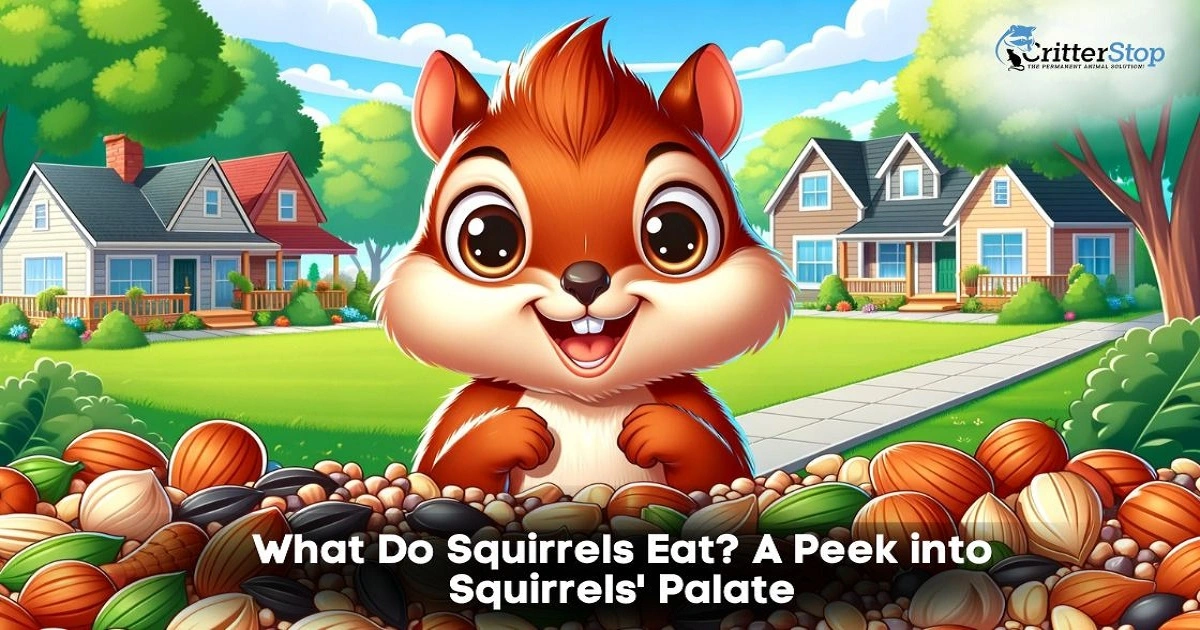
Scurrying through trees with gravity-defying leaps and bounds, squirrels are not just everyday rodents but the enchanting acrobats of the natural world. While their playful antics often amuse us in our backyards, there's much more to these little creatures than meets the eye. Squirrels belong to a diverse and captivating species, each with unique characteristics that contribute to their survival and adaptation.
If you're passionate person for the squirrels and want to know more about their daily menu, you come to the right place! At Critter Stop we had worked for years with this foodie rodent, so we are familiar with their diet. Seat on, and enjoy this article that our experts have prepared for you.
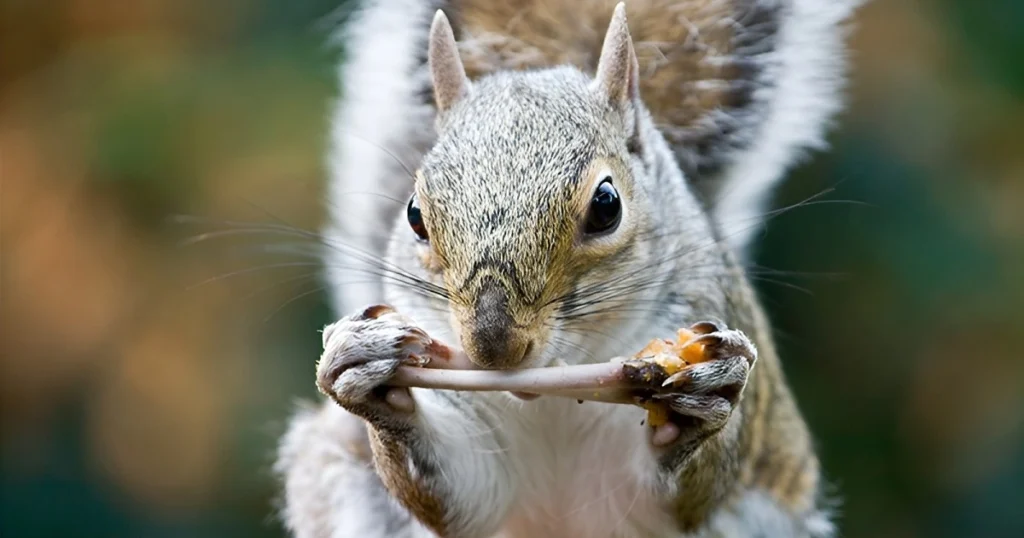
Picture this: a squirrel darting up a tree, cheeks bulging with a treasure trove of nuts. But what exactly fuels these nimble beings? The answer lies in their dynamic and ever-evolving diet. Squirrels are amazing culinary explorers, continuously adapting their menu to the seasons and the environments they inhabit.
From bustling urban parks to serene forests, squirrels demonstrate an extraordinary ability to find sustenance and flourish regardless of their surroundings. It's a captivating journey that explains why squirrels eat nuts, if squirrels eat fruit, and other dietary preferences. So, let's take a closer look at the captivating world of squirrels and the diverse tastes that define their nutritional diet.
Look up in the treetops, where branches become highways and leaves become hideouts. There, you'll find the charismatic tree squirrels, nature's acrobats. With their agile leaps and intricate maneuvers, they traverse the arboreal realm like seasoned performers. But it's not just their acrobatics that shine; it's their diet, too. These treetop dwellers have a penchant for walnuts and fruits. They're the ultimate foragers, skillfully navigating their leafy playgrounds to nab the necessary sustenance. They know how to make the most of their lofty haven, from acorns to apples.
Now, shift your gaze to the earth beneath your feet. Here, the ground squirrels reign supreme. These busy diggers create intricate burrows, constructing cozy homes that hide a culinary secret. Seeds, seeds, and more seeds – that's the heartbeat of their diet. But their menu doesn't stop there. Ground squirrels aren't afraid to venture into the realm of vegetables and even insects, showcasing their adaptable taste buds. They're like the versatile chefs of the grey squirrels world, crafting their meals from the bounty of the ground.
And then, there's a magical twist to the tale – the flying squirrels. Despite their name, they don't possess wings. Instead, they glide through the night like furry, silent shadows. But their dining habits? feed squirrels are anything but stealthy. Fruits, insects, and nuts – that's their formula for sustenance. Like their earthbound and treetop companions, they partake in nature's banquet, albeit with a dash of airborne elegance. Their diet ties them to the circle of life, linking their existence to the very essence of their habitats.
In squirrels, each type boasts a distinctive taste for life. From the lofty heights of the treetops to the bustling activity of the ground and the mysterious glides of the night, squirrels love their diverse diets mirror their extraordinary adaptability.
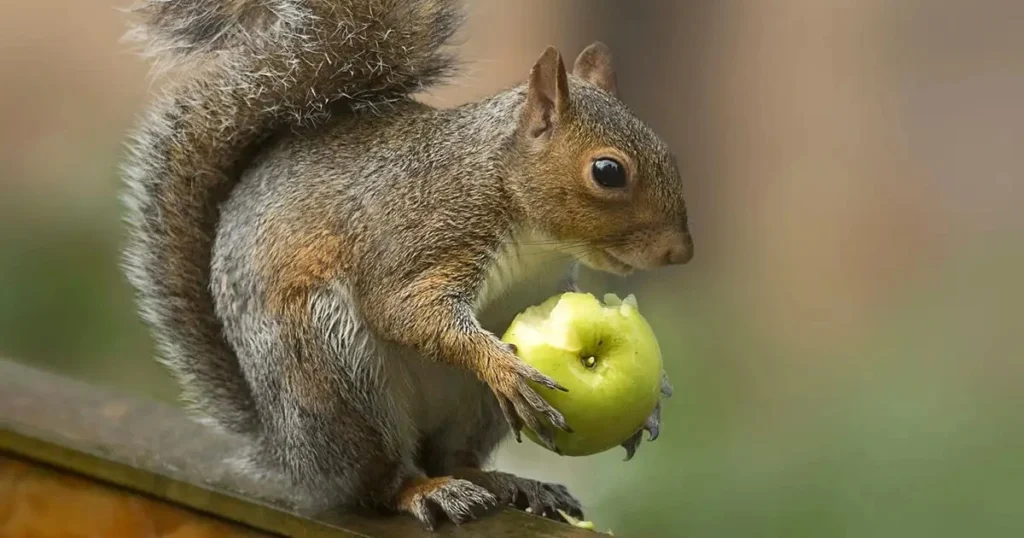
Nuts and seeds – it's like squirrel heaven in a nutshell. These bite-sized powerhouses are the backbone of their diet. Think of them as the energy bars where squirrels eat apples to fuel their daily escapades. Acorns, sunflower seeds, corn, and more are more than just tasty treats; they're packed with essential nutrients that help squirrels go strong. Foraging, hoarding, and nibbling – nuts and seeds are the cornerstone of their culinary journey.
Who knew squirrels were veggie and fungus enthusiasts too? While not the centerpiece of the foods in their diet, some squirrel species like vegetables. Mushrooms and other plant treats find their way onto their menu, showcasing their versatile palate.
Surprise, surprise – squirrels have an omnivore side too. They're not afraid to venture into the world of proteins. Insects like caterpillars become a delectable snack and even eat bird eggs. It's like they have a secret hunting prowess that adds an unexpected twist to their culinary adventure.
We sometimes get asked, “Do squirrels eat birds?” The answer is yes, squirrels will eat birds, but it is more rare. They are opportunistic scavengers, so they are not opposed to eating meat, but it usually isn’t their first choice.
While many people suspect squirrels eat small berries, a common question is, “Do squirrels eat apples?” Yes, squirrels do eat apples. Despite their much larger size, squirrels love a good apple as much as humans - maybe more! Squirrels are the fruit enthusiasts of the wild. Berries bursting with flavor, apples dangling from branches – a fruity feast that adds a dash of sweetness to their lives. But here's the magic: as they savor these juicy treats, they unknowingly play a role in nature's grand plan. Their feasting habits scatter seeds far and wide, weaving them into the ecosystem's fabric. It's like they're nature's gardeners, nurturing future forests' growth.
When we have provided our squirrel removal services in Dallas-Fort Worth área, we have found that the natural diet of squirrels is a testament to their adaptability and resourcefulness. From nuts to fruits, vegetables to insects, they traverse the culinary landscape with an open palate, playing a crucial role in the ecosystems they call home.
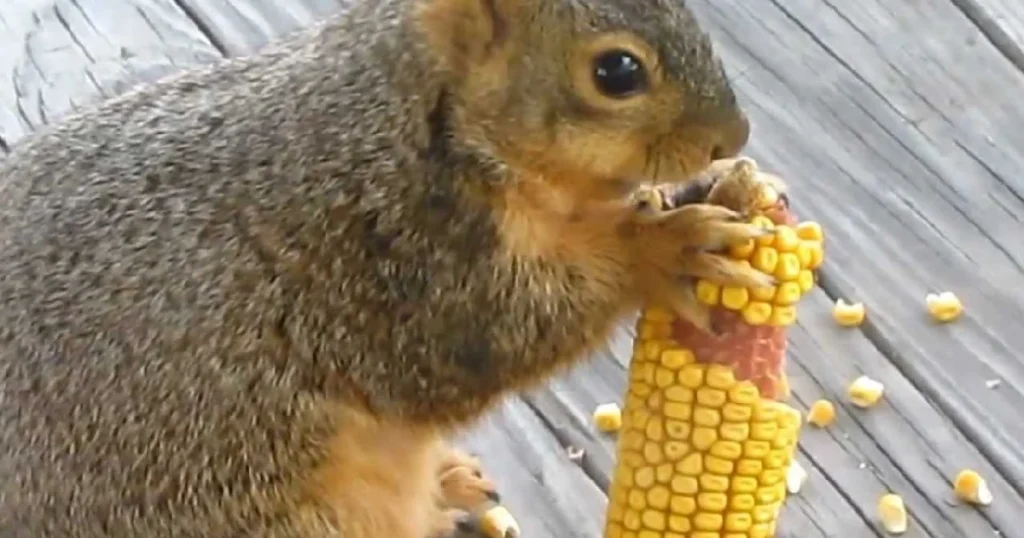
Step into the urban jungle, and you'll find squirrels who've mastered the art of culinary exploration. They've got an eye for scavenging, snacking on human food scraps and even indulging in the occasional leftover. It's like they've joined the ranks of city foodies, discovering hidden delights amidst our culinary chaos.
Your lush backyard can turn into a few red squirrels's salad bar. With a keen taste for plants and vegetables, these adaptable creatures might nibble on your greens and blossoms. They're like the discerning diners of the wild, savoring the flavors of nature and your cultivated garden.
In our experience dealing with squirrels, we can assure you that they aren't just survivors but urban adventurers. Their ability to cover their diet in the bustling world of human habitats is a testament to their resourcefulness. From busy streets to towering skyscrapers, they've discovered new avenues of sustenance, showing us that even in a concrete jungle, the spirit of exploration is alive and well.
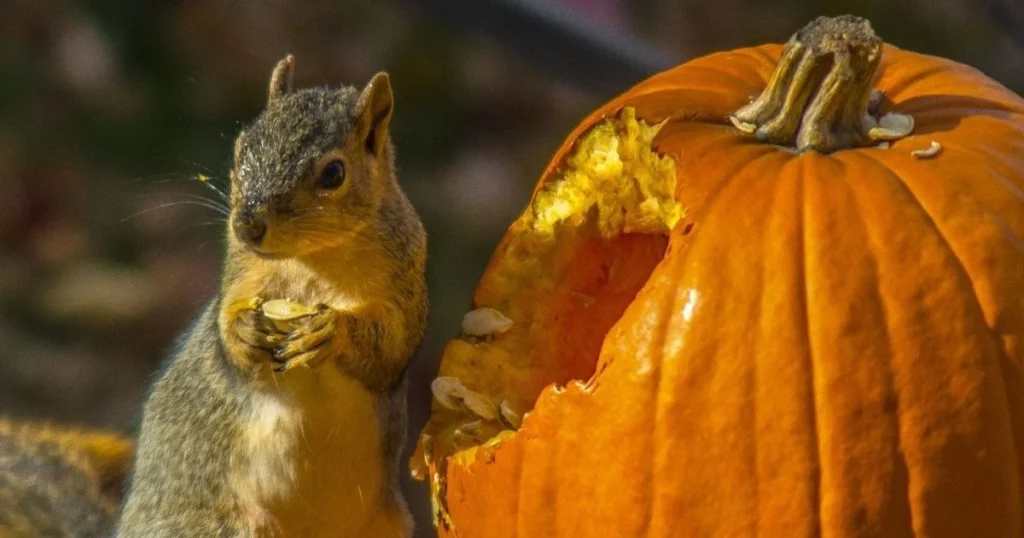
With the arrival of spring, the culinary curtain rises on a fresh act. Squirrels indulge in the tender buds of plants and feast on fungi to supplement their daily menu. It's a symphony of renewal, as nature's pantry offers squirrel feeder a fresh array of delights.
Summer unfurls a vibrant buffet for our bushy-tailed friends. Fruits hang from branches like natural ornaments, berries burst with color, and insects buzz with life. Squirrels dive into this seasonal feast, savoring the abundance of nature's bounty.
As autumn paints the world in warm hues, squirrels gear up for the cold days ahead. Nuts and seeds become their treasures, meticulously stashed away for the winter months. It's a season of preparation feeding squirrels, showcasing their remarkable hoarding behavior.
Winter casts a frosty spell, but squirrels are ready. They turn to their hidden caches of stored food, relying on their foresight and planning to feed themselves. And when food sources are scarce, they might even nibble on tree bark – a testament to their adaptive survival methods.
In the world of squirrels, urban landscapes and changing seasons are just another chapter in their culinary journey. From city streets to natural havens, from spring buds to winter's bark, for food squirrels their diet is a story of adaptation, survival, and the dance of nature's flavors.
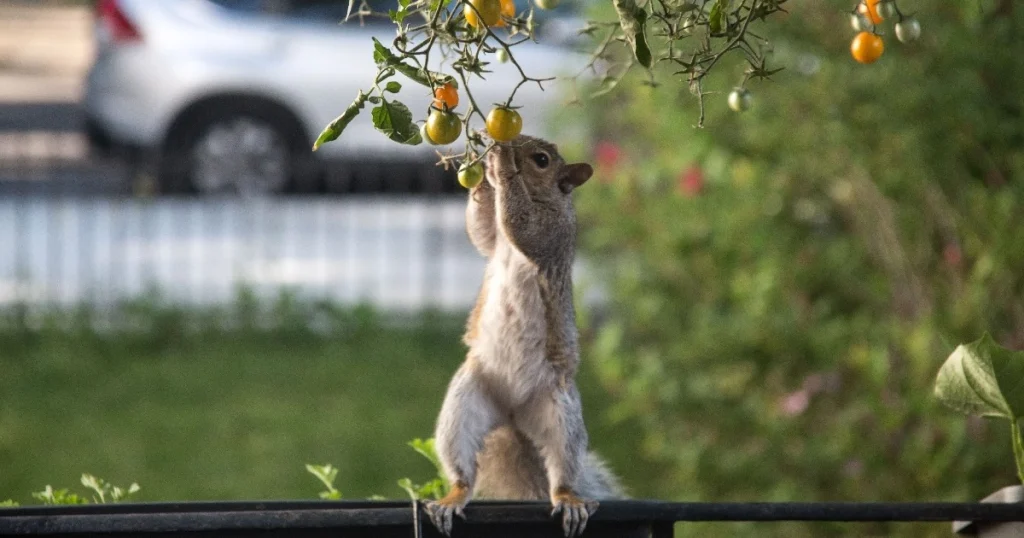
Squirrels are the original preppers of the animal kingdom. Their diet isn't just about filling their bellies; it's a strategic move influencing their hoarding behavior. Those nuts they gather and eat aren't just for today's feast – they're tomorrow's lifeline. The art of burying nuts for later use is a survival strategy that showcases their ability to plan in a world of uncertainty.
Diet isn't just about sustenance; it's also a driving force behind their territorial behavior. Squirrels fiercely defend their food sources, marking their territories determinedly. This fierce attitude could even lead them to fight with animals like snakes, raccoons, and domestic animals like cats and dogs. Those tasty treats are more than just morsels – they're symbols of survival, and squirrels will stop at nothing to protect what's rightfully theirs.
Squirrels, those culinary connoisseurs of the wild, boast a menu as diverse as the landscapes they inhabit. From fruits that burst with sweetness to insects that provide protein-packed snacks, squirrels eat from nuts that power their endeavors to mushrooms that add a touch of wild flavor – their diet is a mosaic of nature's offerings. This versatility in food choices reflects their innate adaptability to various environments, making them true gourmet gatherers of the wild.
Beyond the taste and textures, beyond the hundreds of buried nuts, beyond the bites and nibbles, the grey squirrels eat its diet paints a portrait of their remarkable ability to thrive in ever-changing surroundings. Their dining preferences aren't just about indulgence; they're a testament to their resourcefulness and resilience. Through the seasons and across habitats, squirrels embark on an incredible journey marked by their ever-evolving relationship with food.
If your house starts becoming the new favorite place of these culinary experts, you may need a team that handles this situation for you. At Critter Stop we provide hundreds of squirrel removal services. We are pretty sure that squirrels and you will be happier if each has their kitchen and food storage in different places. Call us at (214) 234-2616 for a free estimation!
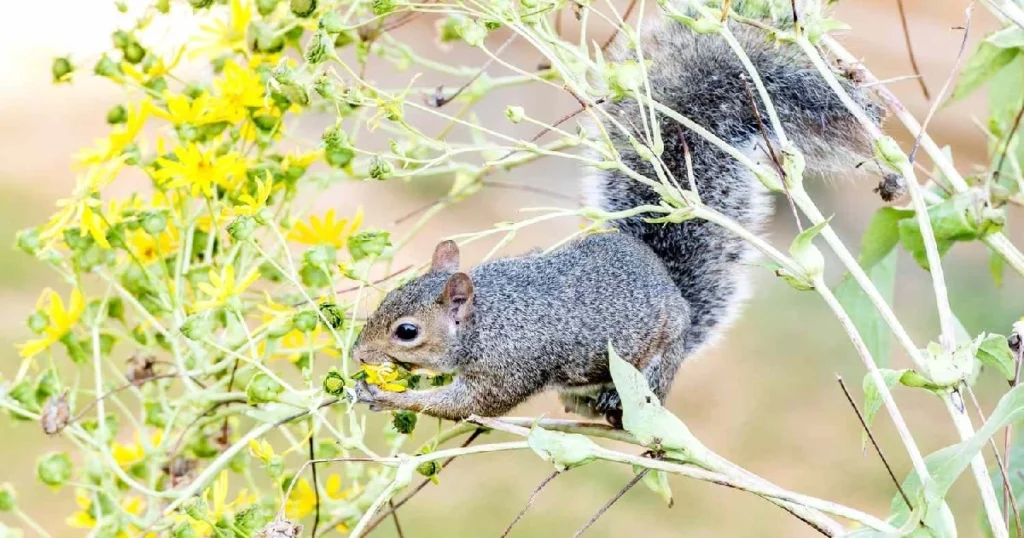
Squirrels are curious and resourceful creatures known for their diverse diets, ranging from nuts and seeds to fruits and occasional insects. Understanding what squirrels eat can help provide them with a balanced diet in natural and urban environments.
In this FAQ section, we'll explore questions about squirrels' dietary habits, from common foods they enjoy to whether certain items are safe to consume. Let's delve into the fascinating world of squirrel dining habits and gain insights into what satisfies these furry foragers.
Yes, squirrels can eat grapes, a tasty treat for squirrels, providing them with hydration and a burst of natural sugars.
While some mushrooms are safe for squirrels, it's best to avoid feeding them wild mushrooms, as they can be toxic. Stick to other squirrel-friendly foods to keep them healthy and happy.
Absolutely! Squirrels enjoy munching on corn, whether it's fresh, cooked, or even dried. It's a nutritious option that adds variety to their diet.
Squirrels are not lactose intolerant, so they can technically eat cheese. However, it's not an ideal food for them as it's high in fat and salt, which can be harmful in large quantities.
While squirrels don't eat pine cones directly, they do nibble on the seeds found inside them. Pine cones provide a natural food source for squirrels, especially during colder months.
Yes, squirrels can eat pistachios. These nuts are a nutritious snack, but it's best to offer them unsalted or lightly salted pistachios in moderation.
Squirrels are primarily herbivores and rarely eat meat. While there may be rare instances of squirrels consuming small reptiles like snakes, it's not a typical part of their diet.
Avocado flesh is safe for squirrels, but they should avoid the skin and pit, as they can be choking hazards. Remember to offer avocado in moderation due to its high-fat content.
Squirrels can technically eat dog food, but it's not recommended. Dog food lacks the nutrients squirrels need for optimal health, so it's best to stick to foods specifically designed for them.
Yes, squirrels do eat safflower seeds. These seeds are popular among backyard bird feeders and are also enjoyed by squirrels.
Yes, squirrels can eat oats. Whether raw or cooked, oats are a good source of carbohydrates and fiber for squirrels.
Squirrels can eat roasted peanuts, but offering them unsalted peanuts is important to prevent health issues associated with excessive salt intake.
Squirrels are diurnal creatures, meaning they are most active during the day and rest at night. They typically forage for food during daylight hours.
While some mushrooms are safe for squirrels, it's best to avoid feeding them wild mushrooms, as they can be toxic. Stick to other squirrel-friendly foods to keep them healthy and happy.
In the summer, squirrels feast on various fruits, vegetables, nuts, seeds, and insects. They take advantage of the abundance of food sources available during the warmer months.
While squirrels are known to nibble on flower bulbs, including tulips, they typically prefer other food sources. Protecting your tulip bulbs with barriers or repellents can help deter squirrels from snacking on them.
Yes, squirrels enjoy eating raspberries. These juicy fruits provide squirrels with essential nutrients and hydration during summer.
It's best to avoid offering squirrels salted nuts, as excessive salt intake can harm their health. Opt for unsalted nuts as a safer alternative.
While squirrels may nibble on pretzels if they come across them, they are not an ideal food choice. Pretzels are high in salt and carbohydrates, which can greatly harm squirrels' health.
Squirrels are primarily herbivores and rarely eat eggs. However, squirrels have been observed stealing and consuming bird eggs, especially when other food sources are scarce.
While unpopped popcorn kernels are not harmful to squirrels or birds, they may pose a choking hazard if not properly chewed. It's best to offer popped popcorn or other safer food options.
Black squirrels have similar dietary habits to other squirrel species, feeding on various nuts, seeds, fruits, and vegetables in their habitat.
Squirrels are primarily herbivores and typically do not eat meat, including baby rabbits. They rely on plant-based foods for their nutritional needs.
Yes, squirrels can eat chia seeds. These tiny seeds are packed with nutrients and are safe for squirrels to consume in moderation.
Yes, squirrels can eat oatmeal. Whether raw or cooked, oatmeal provides squirrels with a good source of carbohydrates and fiber.
While squirrels can technically eat honey roasted peanuts, offering them unsalted or lightly salted peanuts is best to avoid potential health issues associated with excessive sugar and salt intake.
Yes, squirrels love to feast on acorns from oak trees. Acorns are a staple food source for squirrels, especially during the fall when they are abundant.
Squirrels eat nyjer seeds, also known as thistle seeds, especially if they are easily accessible from bird feeders. Using squirrel-proof feeders can help deter squirrels from consuming nyjer seeds intended for birds.
Squirrels are diurnal creatures, meaning they are most active during the day. They typically forage for food and engage in other activities during daylight hours.
Squirrels are not known to eat eggplant. They primarily feed on nuts, seeds, fruits, vegetables, and occasionally insects.
Squirrels may gnaw on tree bark for various reasons, including sharpening their teeth, accessing the nutrient-rich cambium layer beneath it, and creating nesting material.
It's best to avoid offering squirrels salted pistachios, as excessive salt intake can harm their health. Opt for unsalted pistachios as a safer alternative.
Yes, squirrels enjoy eating corn kernels, whether they are fresh, cooked, or dried. Corn is a nutritious food source for squirrels, providing them with carbohydrates and essential nutrients.
While squirrels are primarily herbivores, there have been rare instances of them consuming small amounts of meat, such as insects or bird eggs. However, meat is not a significant part of their diet.
Squirrels do not typically eat owls. In the wild, squirrels and owls occupy different ecological niches, with squirrels primarily feeding on plants and owls preying on small mammals, birds, and insects.
Squirrels are primarily herbivores, meaning they eat plant-based foods like nuts, seeds, fruits, and vegetables. While they may occasionally consume small amounts of insects or meat, it's not a significant part of their diet.
Red squirrels are not known to eat chipmunks. While both species may compete for similar food resources, they typically do not prey on each other.
Rabbits and squirrels may accidentally consume rat poison if it's left out in their environment, but it's not something they actively seek out as food. However, ingesting rat poison can be fatal to them.
Yes, squirrels can eat sesame seeds. These tiny seeds are rich in nutrients and are safe for squirrels to consume in moderation.
Ground squirrels are primarily herbivores but may occasionally consume insects or small amounts of meat. However, meat is not a significant part of their diet.
Yes, squirrels can eat roasted almonds. In moderation, these nuts are a good source of protein and healthy fats for squirrels.
Nuts are a natural and nutritious food source for squirrels, providing them with essential fats, protein, and energy. Squirrels have adapted to forage for and consume nuts as part of their diet.
Squirrels may gnaw on wires out of instinct to sharpen their teeth or because of their natural chewing behavior. To prevent damage to wires and potential hazards, it's essential to squirrel-proof your home and property.
Squirrels are not known to eat moles. They primarily feed on plant-based foods like nuts, seeds, fruits, and vegetables rather than hunting and consuming other animals.
Squirrels are not known to eat bones. Their diet consists mainly of plant-based foods like nuts, seeds, fruits, and vegetables, with occasional insects or small amounts of meat.
Yes, squirrels can eat raw almonds. These nuts are a nutritious snack for them, providing essential fats, protein, and energy.
While squirrels may nibble on various plants and flowers, including daisies, they typically prefer other food sources. Protecting your garden with barriers or repellents can help deter squirrels from snacking on your daisies.
Squirrels can eat peppers but may not enjoy them due to their spicy nature. It's best to offer squirrels milder fruits and vegetables as part of their diet.
Yes, squirrels can eat peanuts in the shell. Peanuts provide squirrels with essential fats, protein, and energy, and they enjoy cracking open the shells to access the nuts inside.
What do pine squirrels eat?
Pine squirrels, or red squirrels, have similar dietary habits to other squirrel species. They feed on various nuts, seeds, fruits, and vegetables found in their habitat, including pine cones and nuts.
Potato chips are not a natural or healthy food choice for squirrels. They are high in salt, fat, and artificial ingredients, which can harm squirrels' health. Start offering them natural foods like nuts, seeds, fruits, and vegetables.
Yes, squirrels can eat hazelnuts in the shell. Hazelnuts provide squirrels with essential fats, protein, and energy, and they enjoy cracking open the shells to access the nuts inside.
Yes, squirrels can eat apricots. These fruits provide squirrels with essential nutrients and hydration, especially during summer.
While squirrels may investigate sweet gum balls out of curiosity, they are not their preferred food source. Sweet gum balls are hard and fibrous, making them difficult for squirrels to consume.
Yes, squirrels can eat peanuts in the shell. Peanuts provide squirrels with essential fats, protein, and energy, and they enjoy cracking open the shells to access the nuts inside.
Squirrels are not typically consumed as food by humans, regardless of whether they reside in urban or rural environments. It's best to enjoy squirrels as wildlife rather than considering them as a food source.
While some species of fungi may be consumed by squirrels, they are not a significant part of their diet. Squirrels primarily feed on nuts, seeds, fruits, and vegetables.
Squirrels are primarily herbivores, meaning they primarily eat plant-based foods. While they may occasionally consume small amounts of insects or meat, it's not a significant part of their diet.
Squirrels may nibble on jalapenos if they come across them, but they may not enjoy them due to their spicy nature. It's best to offer squirrels milder fruits and vegetables as part of their diet.
Squirrels are diurnal creatures, meaning they are most active during the day and rest at night. They typically forage for food during daylight hours.
While squirrels may nibble on cucumbers if they encounter them, cucumbers are not their preferred food source. It's best to offer squirrels more nutritious and palatable fruits and vegetables.
Yes, squirrels can eat walnuts and almonds. These nuts provide squirrels with essential fats, protein, and energy, and they enjoy cracking open the shells to access the nuts inside.
Squirrels may gnaw on electrical wires out of instinct to sharpen their teeth or because of their natural chewing behavior. To prevent damage to wires and potential hazards, it's essential to squirrel-proof your home and property.
Squirrels may consume suet cakes if they encounter them, but they are not a preferred food source for squirrels. Suet cakes are typically intended for birds and may not provide squirrels with the necessary nutrition.
Like adult flying squirrels, baby flying squirrels primarily feed on nuts, seeds, fruits, and insects. Their diet resembles other squirrel species but may include more protein-rich foods to support their growth and development.
While squirrels are primarily herbivores, there have been instances of them consuming bird eggs. However, turtle eggs are not a typical part of their diet.
Yes, squirrels can eat almonds in the shell. Almonds provide squirrels with essential fats, protein, and energy, and they enjoy cracking open the shells to access the nuts inside.
Yes, squirrels can eat apples. These fruits provide squirrels with essential nutrients and hydration, especially when apples are abundant in the fall.
Yes, squirrels can eat macadamia nuts. These nuts provide squirrels with essential fats, protein, and energy, and they enjoy cracking open the shells to access the nuts inside.
It's best to avoid offering squirrels almonds with salt, as excessive salt intake can harm their health. Opt for unsalted almonds as a safer alternative.
Yes, squirrels can eat pumpkin seeds. These seeds are a nutritious snack for squirrels, providing essential fats, protein, and energy.
Squirrels are primarily herbivores and do not typically prey on birds. However, they may consume bird eggs or carrion if they come across them.
While squirrels are primarily herbivores, there have been instances of them consuming bird eggs. However, hard-boiled eggs are not a typical part of their diet.
Yes, squirrels can eat apple cores. While they may prefer the apple's flesh, they can consume the core if necessary.
Squirrels may nibble on dahlia bulbs, especially if they are easily accessible. Protecting your garden with barriers or repellents can help deter squirrels from snacking on your dahlia bulbs.
While squirrels are primarily herbivores, they may occasionally consume insects, especially if other food sources are scarce. However, insects are not a significant part of their diet.
Squirrels may gnaw on tree bark for various reasons, including sharpening their teeth, accessing the nutrient-rich cambium layer beneath it, and creating nesting material.
Red squirrels are primarily herbivores and eat plant-based foods like nuts, seeds, fruits, and vegetables. While they may occasionally consume small amounts of insects or meat, it's not a significant part of their diet.
While squirrels are primarily herbivores, they may occasionally consume bugs, especially if other food sources are scarce. However, bugs are not a significant part of their diet.
Like other mammals, squirrels can produce gas in their digestive systems, which may result in burping or flatulence.
In the winter, squirrels may have a harder time finding food, so offering them nuts, seeds, fruits, and vegetables can help supplement their diet and provide essential nutrients and energy.
Yes, almonds are a nutritious snack for squirrels, providing essential fats, protein, and energy. However, almonds must be offered in moderation as part of a balanced diet.
Yes, walnuts are a nutritious snack for squirrels, providing essential fats, protein, and energy. However, walnuts must be offered in moderation as part of a balanced diet.
Yes, squirrels can eat strawberries. These fruits provide squirrels with essential nutrients and hydration, especially during summer.
Yes, squirrels can eat grapes, Which are a tasty treat for squirrels, providing them with hydration and a burst of natural sugars.
While squirrels may nibble on bread if they encounter it, it's not a natural or nutritious food choice for them. Instead, offer squirrels natural foods like nuts, seeds, fruits, and vegetables.
Yes, squirrels can eat bananas. These fruits provide squirrels with essential nutrients and hydration, making them a nutritious snack option.
Squirrels can eat raisins, but due to their high sugar content, they must be offered in moderation. Raisins can be a tasty treat for squirrels when offered occasionally.
No, chocolate is toxic to squirrels and should never be offered. Chocolate contains theobromine, which can be fatal to squirrels if ingested.
Yes, chocolate is toxic to squirrels and should never be offered. Chocolate contains theobromine, which can be fatal to squirrels if ingested.
Visit our Critter Library and learn more about our furry friends